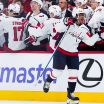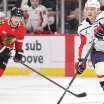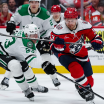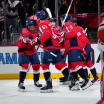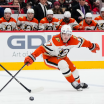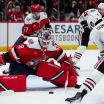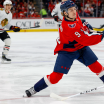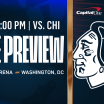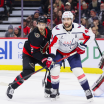Caps Host Hawks
With John Carlson likely to return to Caps' lineup on Thursday vs. Chicago, an in-depth look at the impact of his three-month absence
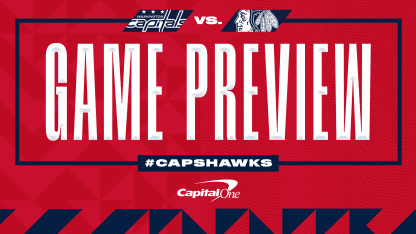
The Capitals close out a two-game homestand and finish up their 2022-23 business with Western Conference opponents on Thursday night when the Chicago Blackhawks visit Capital One Arena.
Most importantly for Washington, the team is expected to have defenseman John Carlson on the ice and in the lineup for the first time in exactly three months, since he suffered a fractured skull and severed temporal artery after catching a Brenden Dillon slapshot above the neck in a Dec. 23 game against Winnipeg.
Washington was in a playoff position at the time of the Carlson injury, but it has tumbled down to 10th place in the Eastern Conference standings without its top defenseman, five points south of the Florida Panthers, the current occupants of the eighth and final playoff berth in the East. With Carlson now on the verge of returning after a frightening injury followed by a three-month absence, it's worth taking a deeper dive into how the Caps fared in his absence.
Carlson has played in 30 games for the Capitals this season, and Washington is 18-10-2 (.633 points percentage) in those games. In the 42 games Carlson has missed, the team is just 15-21-6 (.429). Dating back to the outset of the 2017-18 season, the Caps are 251-144-48 overall, the seventh best record in the NHL over that span (.621). But Washington has won just 19 of the 52 games (19-26-7) it has played without Carlson over that stretch (.433).
In addition to missing each of the Caps' last 36 games since that Dec. 23 injury, Carlson missed six games early in the season with a lower body injury. Washington won only one of those six games (1-3-2), and it went 14-18-4 over these last 36 games.
During the two stretches in which Carlson was out of the lineup, the Caps were never able to string together as many as three straight victories at any point, and they were able to win two straight only twice.
In the 30 games in which Carlson has been in the lineup, the Caps have outscored the opposition by a combined total of 98-81 (plus-17 goal differential, averaging 3.27 goals per game and 2.7 goals against). In the 42 games without Carlson, the Caps were outscored by a combined total of 142-127 (minus-15 goal differential, averaging 3.02 goals per game and 3.38 goals against). That's a 32-goal swing in a span of 42 games. They've scored a quarter of a goal less per game without Carlson, and they've yielded half a goal more. During these last 36 games without Carlson in the lineup, the Caps' .444 points percentage ranks 29th in the NHL, ahead of only Columbus, Montreal and San Jose.
Carlson has averaged 23:24 per game in ice time this season, and those minutes had to be spread around the remainder of the lineup during his absence. In the last 36 games, the Caps have used 11 different defensemen with Rasmus Sandin (average of 25:00 in nine games) at the high end of the ice time average and Dylan McIlrath (average of 11:41 in six games) at the low end.
Seven of the 11 defensemen deployed by the Caps in the last 36 games have averaged more ice time than their career averages, and by multiple minutes in most cases. When a team's entire defense corps has to suddenly shoulder a heavier workload and it must do so over what constitutes half of the season, some players will be able to handle it and some will struggle.
Here's a look at the Caps' defense ice time figures over the last 36 games (first ice time total is average over last 36 games, second is career nightly average):
Rasmus Sandin (nine games, 25:00/17:10), Dmitry Orlov (23 games, 23:18/20:11), Erik Gustafsson (26 games, 21:43/19:06), Trevor van Riemsdyk (35 games, 20:59/17:23), Nick Jensen (20:17/18:28), Martin Fehervary (31 games, 19:27/19:32), Alex Alexeyev (17 games, 17:43/16:12), Vincent Iorio (three games, 14:21/14:21), Gabriel Carlsson (six games, 13:46/12:38), Matt Irwin (29 games, 13:01/15:28) and Dylan McIlrath (six games, 11:41/13:31).
Orlov struggled (38.71 GF%) at 5-on-5 during that stretch and Gustafsson thrived (64.44 GF%), but both were traded away ahead of the March 3 trade deadline, with Sandin coming back from Toronto as part of the return in those swaps.
Fehervary is averaging only five seconds less per night (19:27) than his career average (19:32), but throughout last season Carlson was Fehervary's most frequent partner, and the duo played more total minutes together (1048:47) than any on the team. The Carlson-Fehervary duo was lauded by Caps' coach Peter Laviolette, who had this to say about the success of the pairing back in September:
"I think it was a really good pairing, and we never touched it. You don't know until you put something together. You don't know if Marty's going to be able to handle that because John plays against top tier opponents - first line players and second line players.
"But as we watched Marty play more and more, we saw his strength - even though he was a rookie, and he was young. You see his strength defensively, you see his strength physically, you see his strength in being able to play against players like that. It became a really good pair; Marty from a defending standpoint and a skating standpoint, and John from an offensive standpoint and moving the play out of our end and up the ice. And they both do the other part, too; John's a pretty good defender and Marty is pretty good offensively.
"But the strength of Marty is his ability to defend and the strength of John is his ability to create. And the fact that John has been in the league for a long time and it was Marty's first year, it was really good pairing in the sense that I think John really helped him, helped him with his game, helped him understand the opponents and how to play. And I think Marty helped John out at times through with while he was able to play the game, so the pairing was really good. But when you get a veteran player like John and somebody who's been able to accomplish the things that he accomplished, and he's willing to work with a young player like Marty, then that's a that's a real good pair, a real good combination."
The Caps only had Carlson and Fehervary together briefly this season, and the duo struggled with a 40 GF% and an anemic 44.54% of shot attempts at 5-on-5 in a small sample of 67:13. Washington's coaching staff might have revisited that duo again at some point, but it hasn't had the opportunity. Fehervary's most frequent partner this season has been Jensen, and the two have combined for a 57.14 GF% and a 48.53% of shot attempts at 5-on-5.
A Gustafsson/Carlson pairing was effective, and one might wonder whether Gustafsson and Orlov might still be sporting Caps' sweaters if Carlson hadn't caught that Dillon shot to the head three months ago. The domino effect of Carlson's absence and the resulting drag down the standings has impacted every defenseman on the team. Orlov and Gustafsson are gone, Jensen and van Riemsdyk each got three-year contract extensions, and Alexeyev finally got some legitimate playing time, but only after the deals that moved Orlov and Gustafsson.
Washington has been beset by a bevy of injuries since before the season even started, and the spate hasn't slowed much over the 72 games played to this point; the Caps will exceed 400 man-games lost to injuries in 2022-23. But the injury to Carlson has proven to be the most devastating of all of them. Entering this season, he had only missed 46 games total over the previous dozen seasons.
Carlson has averaged 4:21 per night in power-play ice time this season, tops among all defensemen in the NHL. In the 42 games the Caps played without Carlson this season, they didn't get a single power-play goal from another defenseman.
There are only 22 defensemen in the League who average three or more minutes per night with the extra man, and although his shorthanded duties have been curtailed as he has aged, Carlson still averages 1:53 per night in shorthanded ice time, too. The other defensemen in the League with three or more minutes a night on the power play and at least 1:50 per night shorthanded are guys with names like Cale Makar, Aaron Ekblad, Moritz Seider, Drew Doughty, Brent Burns and Adam Fox. None of those players missed as many games as Carlson did this season, but their teams likely would have struggled mightily to fill those situational minutes if they had.
Carlson's return is likely a bit too late to save the Caps' season. As he steps back into the lineup, the Caps are seeking to shake a three-game losing streak when they are in dire need of a lengthy winning run. On the night that Carlson was injured, the Caps won their fourth straight game and won for the ninth time in 10 games. They've got 10 games left now, and even winning nine of 10 - or all 10 - could leave them outside the playoffs for the first time in nine seasons.
Chicago is one of four teams that have been mathematically eliminated from playoff contention. They'll be making the fourth stop on a five-game road trip in Washington on Thursday, and the Hawks will be looking to get even for the trip. After downing the Preds in Nashville in the trip opener last Thursday, Chicago lost in Arizona and Colorado, respectively.
In the middle of last month, the Hawks put together a five-game winning streak that included victories over a trio of playoff-bound teams: Toronto, Vegas and Dallas. The latter two wins were achieved on the road.
(Statistical data from nhl.com and naturalstattrick.com)


